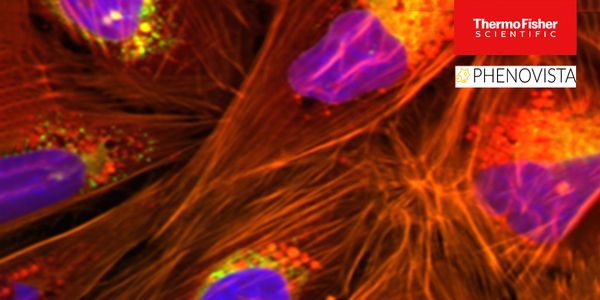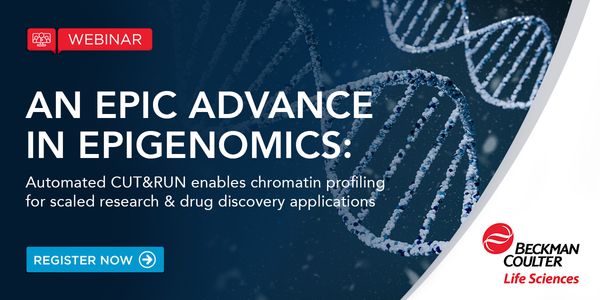Antibodies
Antibodies are blood proteins produced in response to and counteracting a specific antigen. Antibodies combine chemically with substances that the body recognizes as alien, such as bacteria, viruses, and foreign substances in the blood.
-
De novo gene synthesis and protein expression are established technologies that can give access to nearly any target DNA or protein sequence, allowing for engineering of biologics. In this p...Speaker: Claudia ChiocchiniPresented at: Cancer Research & Oncology Virtual Event Series 2024
Sponsored By: Thermo Fisher Scientific
MAR 28, 2024 | 8:00 AM
B cell responses within pancreatic ductal adenocarcinoma (PDAC) tumors are associated with improved patient outcomes, yet the specific triggering antigens remain largely unknown. In this web...
FEB 08, 2024 | 10:00 AM
High-content screening (HCS) is an imaging-based, multi-parametric strategy used in drug development that generates rich datasets through multiplexing strategically chosen fluorescent dyes a...
Most FDA-approved therapeutic drugs target transmembrane proteins, yet the development of monoclonal antibodies for multi-transmembrane protein targets has been limited. Despite the abundanc...
NOV 14, 2023 | 10:00 AM
C.E. CREDITS
Assessment for anti-dsDNA antibodies provides some of the most significant challenges in autoantibody serology testing. Anti-dsDNA antibodies are an important biomarker for systemic lupus er...
NOV 08, 2023 | 8:00 AM
AAVs and LNPs are complementary gene transfer systems with respect to immunogenicity, tissue tropism and types of nucleic acids, which can be delivered. AUC provides a wealth of orthogonal a...
OCT 24, 2023 | 10:00 AM
Dynamic changes in chromatin drive gene expression programs during cellular development and contribute to pathological changes underlying disease. To date, efforts to characterize chromatin...
OCT 24, 2023 | 8:00 AM
To bring your cutting-edge cell and gene therapies to the patients that need them as quickly as possible, you need access to the most knowledgeable scientists, innovative technologies, metho...
OCT 16, 2023 | 9:00 AM
Clarification of mammalian and bacterial cell broths can be challenging when it comes to managing filter capacity and maximizing product recovery. Body feed filtration is an innovative techn...
OCT 05, 2023 | 1:00 AM
C.E. CREDITS
Organoids continue to gain traction in drug discovery efforts as they offer a more biologically relevant disease model than traditional approaches. But they aren't without challenges. Jo...
SEP 28, 2023 | 10:00 AM
Accurate diagnosis of H. pylori infection remains both crucial and challenging today. In line with current guidelines, confirming eradication after antibiotic treatment is essential. Diagnos...
SEP 13, 2023 | 10:00 AM
Liquid biopsy is an emerging area of clinical research, particularly in the context of cancer. As a minimally invasive complementary or alternative approach to tissue biopsies, liquid biopsi...
Speaker:
Dr. Eloisa Jantus Lewintre, PhD
, Dr. Gorka Alkorta-Aranburu
, Matteo Allegretti, PhD
Presented at: The Future of Cutting-Edge Genomic Technologies for Liquid Biopsy Cancer Research
Sponsored By: Thermo Fisher Scientific
Sponsored By: Thermo Fisher Scientific
September 13 at 10:00am CEST, 9:00am BST
Webinar airing too early or too late for you? This webinar will also be available: September 13 at 10:00am PDT, 1:00pm EDT https://www.labroots.com/ms/webinar/dpcr-liquidbiopsy-panel-2 and S...
Speaker:
Dr. Eloisa Jantus Lewintre, PhD
, Dr. Gorka Alkorta-Aranburu
, Matteo Allegretti, PhD
Presented at: The Future of Cutting-Edge Genomic Technologies for Liquid Biopsy Cancer Research
Sponsored By: Thermo Fisher Scientific
Sponsored By: Thermo Fisher Scientific
September 13 at 9:30am IST, 12:00pm CST/SGT
Liquid biopsy is an emerging area of clinical research, particularly in the context of cancer. As a minimally invasive complementary or alternative approach to tissue biopsies, liquid biopsi...
Speaker:
Dr. Eloisa Jantus Lewintre, PhD
, Dr. Gorka Alkorta-Aranburu
, Matteo Allegretti, PhD
Presented at: The Future of Cutting-Edge Genomic Technologies for Liquid Biopsy Cancer Research
Sponsored By: Thermo Fisher Scientific
Sponsored By: Thermo Fisher Scientific
SEP 12, 2023 | 8:00 AM
SPRm (Surface Plasmon Resonance Microscopy) is a novel technology that enables label-free and real-time measurements of the binding affinity and kinetics of small molecules to G protein-coup...
SEP 06, 2023 | 8:00 AM
The expansion and persistence of CAR T cells within patients is the key to a successful treatment. Therefore, monitoring of CD19 CAR T cells following infusion is of utmost interest. The CAR...
Speaker:
Dr. Annika Graband
, Dr. Sabine Hünecke
, Dr. Melanie Bremm
Sponsored By: Miltenyi Biotec
AUG 24, 2023 | 9:00 AM
Join us in an engaging webinar as Adrian Simpson, from HDT Bio, delves into the intriguing science behind their novel emulsion platform, known as LION. Discover how this cutting-edge platfor...
AUG 16, 2023 | 8:00 AM
Watch this webinar and explore Miltenyi Biotec’s solutions to advance CAR T-cell therapies – from basic research to process development and clinical manufacturing. Discover the p...
Speaker:
Dr. Annika Graband
, Dr. Melanie Rietenbach
, Dr. Saskia Rösch
Sponsored By: Miltenyi Biotec
AUG 10, 2023 | 8:00 AM
C.E. CREDITS
Antibody therapeutics is a fast-growing market boosted by developments in bispecific antibodies and in newly emerging tetra-specific antibodies. With the ability to recruit a combination of...
AUG 01, 2023 | 10:00 PM
C.E. CREDITS
Stem cells have the capability to develop into any specialized cell type, which makes them a valuable resource in research and regenerative medicine. Differentiated stem cell models provide...
AUG 01, 2023 | 9:00 AM
C.E. CREDITS
Testing for abnormal immunoglobulins was based previously on serum electrophoresis and immunofixation only. In the last years, however, free light chain (FLC) testing in serum became one imp...
JUL 20, 2023 | 9:00 AM
This webinar will provide an overview of the antibody discovery process, from target validation to candidate selection, highlighting the critical steps involved in developing effective antib...
JUN 20, 2023 | 10:00 AM
C.E. CREDITS
Spatial biology enables researchers to characterize combined molecular information and spatial...
JUN 15, 2023 | 8:00 AM
C.E. CREDITS
ELISA (Enzyme-Linked Immunosorbent Assay) is a powerful and well-established method that enables researchers to detect and quantify a wide range of soluble substances, such as peptides, prot...
De novo gene synthesis and protein expression are established technologies that can give access to nearly any target DNA or protein sequence, allowing for engineering of biologics. In this p...
Speaker:
Claudia Chiocchini
Presented at: Cancer Research & Oncology Virtual Event Series 2024
Sponsored By: Thermo Fisher Scientific
Sponsored By: Thermo Fisher Scientific
MAR 28, 2024 | 8:00 AM
B cell responses within pancreatic ductal adenocarcinoma (PDAC) tumors are associated with improved patient outcomes, yet the specific triggering antigens remain largely unknown. In this web...
FEB 08, 2024 | 10:00 AM
High-content screening (HCS) is an imaging-based, multi-parametric strategy used in drug development that generates rich datasets through multiplexing strategically chosen fluorescent dyes a...
Most FDA-approved therapeutic drugs target transmembrane proteins, yet the development of monoclonal antibodies for multi-transmembrane protein targets has been limited. Despite the abundanc...
NOV 14, 2023 | 10:00 AM
C.E. CREDITS
Assessment for anti-dsDNA antibodies provides some of the most significant challenges in autoantibody serology testing. Anti-dsDNA antibodies are an important biomarker for systemic lupus er...
NOV 08, 2023 | 8:00 AM
AAVs and LNPs are complementary gene transfer systems with respect to immunogenicity, tissue tropism and types of nucleic acids, which can be delivered. AUC provides a wealth of orthogonal a...
OCT 24, 2023 | 10:00 AM
Dynamic changes in chromatin drive gene expression programs during cellular development and contribute to pathological changes underlying disease. To date, efforts to characterize chromatin...
OCT 24, 2023 | 8:00 AM
To bring your cutting-edge cell and gene therapies to the patients that need them as quickly as possible, you need access to the most knowledgeable scientists, innovative technologies, metho...
OCT 16, 2023 | 9:00 AM
Clarification of mammalian and bacterial cell broths can be challenging when it comes to managing filter capacity and maximizing product recovery. Body feed filtration is an innovative techn...
OCT 05, 2023 | 1:00 AM
C.E. CREDITS
Organoids continue to gain traction in drug discovery efforts as they offer a more biologically relevant disease model than traditional approaches. But they aren't without challenges. Jo...
SEP 28, 2023 | 10:00 AM
Accurate diagnosis of H. pylori infection remains both crucial and challenging today. In line with current guidelines, confirming eradication after antibiotic treatment is essential. Diagnos...
SEP 13, 2023 | 10:00 AM
Liquid biopsy is an emerging area of clinical research, particularly in the context of cancer. As a minimally invasive complementary or alternative approach to tissue biopsies, liquid biopsi...
Speaker:
Dr. Eloisa Jantus Lewintre, PhD
, Dr. Gorka Alkorta-Aranburu
, Matteo Allegretti, PhD
Presented at: The Future of Cutting-Edge Genomic Technologies for Liquid Biopsy Cancer Research
Sponsored By: Thermo Fisher Scientific
Sponsored By: Thermo Fisher Scientific
September 13 at 10:00am CEST, 9:00am BST
Webinar airing too early or too late for you? This webinar will also be available: September 13 at 10:00am PDT, 1:00pm EDT https://www.labroots.com/ms/webinar/dpcr-liquidbiopsy-panel-2 and S...
Speaker:
Dr. Eloisa Jantus Lewintre, PhD
, Dr. Gorka Alkorta-Aranburu
, Matteo Allegretti, PhD
Presented at: The Future of Cutting-Edge Genomic Technologies for Liquid Biopsy Cancer Research
Sponsored By: Thermo Fisher Scientific
Sponsored By: Thermo Fisher Scientific
September 13 at 9:30am IST, 12:00pm CST/SGT
Liquid biopsy is an emerging area of clinical research, particularly in the context of cancer. As a minimally invasive complementary or alternative approach to tissue biopsies, liquid biopsi...
Speaker:
Dr. Eloisa Jantus Lewintre, PhD
, Dr. Gorka Alkorta-Aranburu
, Matteo Allegretti, PhD
Presented at: The Future of Cutting-Edge Genomic Technologies for Liquid Biopsy Cancer Research
Sponsored By: Thermo Fisher Scientific
Sponsored By: Thermo Fisher Scientific
SEP 12, 2023 | 8:00 AM
SPRm (Surface Plasmon Resonance Microscopy) is a novel technology that enables label-free and real-time measurements of the binding affinity and kinetics of small molecules to G protein-coup...
SEP 06, 2023 | 8:00 AM
The expansion and persistence of CAR T cells within patients is the key to a successful treatment. Therefore, monitoring of CD19 CAR T cells following infusion is of utmost interest. The CAR...
Speaker:
Dr. Annika Graband
, Dr. Sabine Hünecke
, Dr. Melanie Bremm
Sponsored By: Miltenyi Biotec
AUG 24, 2023 | 9:00 AM
Join us in an engaging webinar as Adrian Simpson, from HDT Bio, delves into the intriguing science behind their novel emulsion platform, known as LION. Discover how this cutting-edge platfor...
AUG 16, 2023 | 8:00 AM
Watch this webinar and explore Miltenyi Biotec’s solutions to advance CAR T-cell therapies – from basic research to process development and clinical manufacturing. Discover the p...
Speaker:
Dr. Annika Graband
, Dr. Melanie Rietenbach
, Dr. Saskia Rösch
Sponsored By: Miltenyi Biotec
AUG 10, 2023 | 8:00 AM
C.E. CREDITS
Antibody therapeutics is a fast-growing market boosted by developments in bispecific antibodies and in newly emerging tetra-specific antibodies. With the ability to recruit a combination of...
AUG 01, 2023 | 10:00 PM
C.E. CREDITS
Stem cells have the capability to develop into any specialized cell type, which makes them a valuable resource in research and regenerative medicine. Differentiated stem cell models provide...
AUG 01, 2023 | 9:00 AM
C.E. CREDITS
Testing for abnormal immunoglobulins was based previously on serum electrophoresis and immunofixation only. In the last years, however, free light chain (FLC) testing in serum became one imp...
JUL 20, 2023 | 9:00 AM
This webinar will provide an overview of the antibody discovery process, from target validation to candidate selection, highlighting the critical steps involved in developing effective antib...
JUN 20, 2023 | 10:00 AM
C.E. CREDITS
Spatial biology enables researchers to characterize combined molecular information and spatial...
JUN 15, 2023 | 8:00 AM
C.E. CREDITS
ELISA (Enzyme-Linked Immunosorbent Assay) is a powerful and well-established method that enables researchers to detect and quantify a wide range of soluble substances, such as peptides, prot...
























